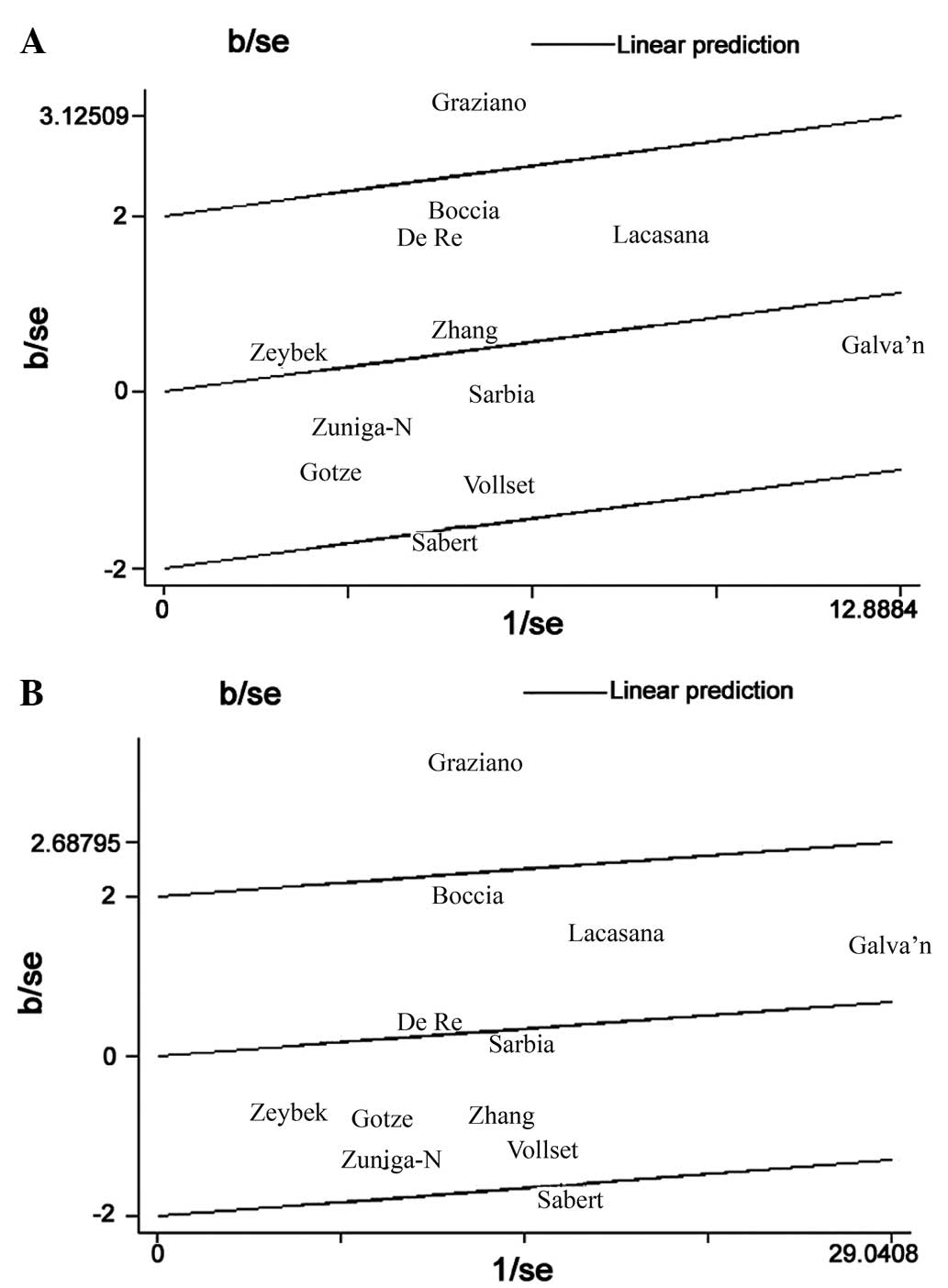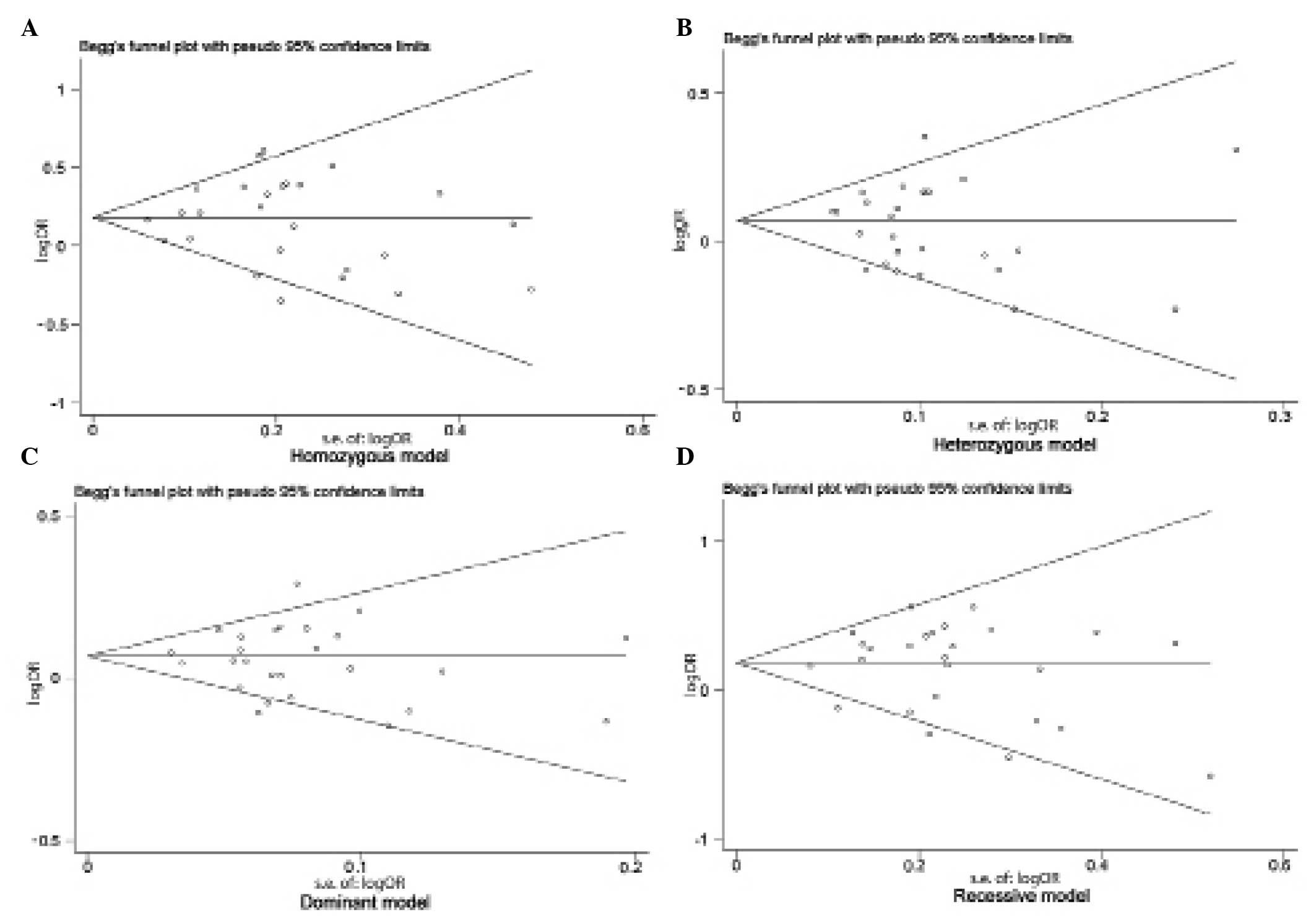|
1
|
Ahn DH, Rah H, Choi YK, et al: Association
of the miR-146aC>G, miR-149T>C, miR-196a2T>C, and
miR-499A>G polymorphisms with gastric cancer risk and survival
in the Korean population. Mol Carcinog (Suppl 1). 52:E39–E51. 2013.
View Article : Google Scholar
|
|
2
|
Persson C, Canedo P, Machado JC, El-Omar
EM and Forman D: Polymorphisms in inflammatory response genes and
their association with gastric cancer: A HuGE systematic review and
meta-analyses. Am J Epidemiol. 173:259–270. 2011. View Article : Google Scholar : PubMed/NCBI
|
|
3
|
Zhang FF, Terry MB, Hou L, et al: Genetic
polymorphisms in folate metabolism and the risk of stomach cancer.
Cancer Epidemiol Biomarkers Prev. 16:115–121. 2007. View Article : Google Scholar : PubMed/NCBI
|
|
4
|
Warshauer ME, Silverman DT, Schottenfeld D
and Pollack ES: Stomach and colorectal cancers in Puerto Rican-born
residents of New York City. J Natl Cancer Inst. 76:591–595.
1986.PubMed/NCBI
|
|
5
|
Jacques PF, Bostom AG, Williams RR, et al:
Relation between folate status, a common mutation in
methylenetetrahydrofolate reductase, and plasma homocysteine
concentrations. Circulation. 93:7–9. 1996. View Article : Google Scholar : PubMed/NCBI
|
|
6
|
Mu LN, Cao W, Zhang ZF, et al:
Polymorphisms of 5, 10-methylenetetralydrofolate reductase (MTHFR),
fruit and vegetable intake, and the risk of stomach cancer.
Biomarkers. 12:61–75. 2007. View Article : Google Scholar : PubMed/NCBI
|
|
7
|
Gao C, Wu J, Ding J, et al: Polymorphisms
of methylenetetrahydrofolate reductase C677T and the risk of
stomach cancer. Zhonghua Liu Xing Bing Xue Za Zhi. 23:289–292.
2002.(In Chinese). PubMed/NCBI
|
|
8
|
Miao X, Xing D, Tan W, Qi J, Lu W and Lin
D: Susceptibility to gastric cardia adenocarcinoma and genetic
polymorphisms in methylenetetrahydrofolate reductase in an at-risk
Chinese population. Cancer Epidemiol Biomarkers Prev. 11:1454–1458.
2002.PubMed/NCBI
|
|
9
|
Bi J, Cai L and Zheng Z: Study on C667T
gene polymorphism and susceptibility to gastric cancer. Chin J
Public. 21:6612005.
|
|
10
|
Shen H, Newmann AS, Hu Z, et al:
Methylenetetrahydrofolate reductase polymorphisms/haplotypes and
risk of gastric cancer: A case-control analysis in China. Oncol
Rep. 13:355–360. 2005.PubMed/NCBI
|
|
11
|
Boccia S, Gianfagna F, Persiani R, et al:
Methylenetetrahydrofolate reductase C677T and A1298C polymorphisms
and susceptibility to gastric adenocarcinoma in an Italian
population. Biomarkers. 12:635–644. 2007. View Article : Google Scholar : PubMed/NCBI
|
|
12
|
Götze T, Röcken C, Röhl FW, et al: Gene
polymorphisms of folate metabolizing enzymes and the risk of
gastric cancer. Cancer Lett. 251:228–236. 2007. View Article : Google Scholar : PubMed/NCBI
|
|
13
|
Graziano F, Kawakami K, Ruzzo A, et al:
Methylenetetrahydrofolate reductase 677C/T gene polymorphism,
gastric cancer susceptibility and genomic DNA hypomethylation in an
at-risk Italian population. Int J Cancer. 118:628–632. 2006.
View Article : Google Scholar : PubMed/NCBI
|
|
14
|
Sarbia M, Geddert H, Kiel S, et al:
Methylenetetrahydrofolate reductase C677T polymorphism and risk of
adenocarcinoma of the upper gastrointestinal tract. Scand J
Gastroenterol. 40:109–111. 2005. View Article : Google Scholar : PubMed/NCBI
|
|
15
|
Li S, Ji M, He N and Lu Z: Application of
microarray-based method for methylenetetrahydrofolate reductase
(MTHFR) polymorphisms in the risk of gastric carcinoma in east
China population. J Nanosci Nanotechnol. 7:3245–3249. 2007.
View Article : Google Scholar : PubMed/NCBI
|
|
16
|
Wang Y, Guo W, He Y, et al: Association of
MTHFR C677T and SHMT1 C1420T with susceptibility to ESCC and GCA in
a high incident region of Northern China. Cancer Causes Control.
18:143–152. 2007. View Article : Google Scholar : PubMed/NCBI
|
|
17
|
Weng YR, Sun DF, Fang JY, Gu WQ and Zhu
HY: Folate levels in mucosal tissue but not
methylenetetrahydrofolate reductase polymorphisms are associated
with gastric carcinogenesis. World J Gastroenterol. 12:7591–7597.
2006.PubMed/NCBI
|
|
18
|
Si PR, Fang DC, Zhang H, Yang LQ, Luo YH
and Liao HY: The relationship between methylenetetrahydrofolate
reductase gene polymorphism and microsatellite instability in
gastric cancer. Zhonghua Liu Xing Bing Xue Za Zhi. 26:794–799.
2005.(In Chinese). PubMed/NCBI
|
|
19
|
Kim JK, Kim S, Han JH, et al:
Polymorphisms of 5,10-methylenetetrahydrofolate reductase and risk
of stomach cancer in a Korean population. Anticancer Res.
25:2249–2252. 2005.PubMed/NCBI
|
|
20
|
Wang LD, Guo RF, Fan ZM, et al:
Association of methylenetetrahydrofolate reductase and thymidylate
synthase promoter polymorphisms with genetic susceptibility to
esophageal and cardia cancer in a Chinese high-risk population. Dis
Esophagus. 18:177–184. 2005. View Article : Google Scholar : PubMed/NCBI
|
|
21
|
Stolzenberg-Solomon RZ, Qiao YL, Abnet CC,
et al: Esophageal and gastric cardia cancer risk and folate- and
vitamin B(12)-related polymorphisms in Linxian, China. Cancer
Epidemiol Biomarkers Prev. 12:1222–1226. 2003.PubMed/NCBI
|
|
22
|
Galván-Portillo MV, Cantoral A,
Oñate-Ocaña LF, et al: Gastric cancer in relation to the intake of
nutrients involved in one-carbon metabolism among MTHFR 677 TT
carriers. Eur J Nutr. 48:269–276. 2009. View Article : Google Scholar : PubMed/NCBI
|
|
23
|
Zúñiga-Noriega JR, Velazco-Campos Mdel R,
Aguirre-Rodríguez A, et al: C677T polymorphism of the MTHFR gene
and the risk of developing distal gastric cancer in a Mexican
population. Rev Gastroenterol Mex. 72:355–358. 2007.(In Spanish).
PubMed/NCBI
|
|
24
|
Lacasaña-Navarro M, Galván-Portillo M,
Chen J, López-Cervantes M and López-Carrillo L:
Methylenetetrahydrofolate reductase 677C>T polymorphism and
gastric cancer susceptibility in Mexico. Eur J Cancer. 42:528–533.
2006. View Article : Google Scholar : PubMed/NCBI
|
|
25
|
Vollset SE, Igland J, Jenab M, et al: The
association of gastric cancer risk with plasma folate, cobalamin,
and methylenetetrahydrofolate reductase polymorphisms in the
European Prospective Investigation into Cancer and Nutrition.
Cancer Epidemiol Biomarkers Prev. 16:2416–2424. 2007. View Article : Google Scholar : PubMed/NCBI
|
|
26
|
Zeybek U, Yaylim I, Yilmaz H, et al:
Methylenetetrahydrofolate reductase C677T polymorphism in patients
with gastric and colorectal cancer. Cell Biochem Funct. 25:419–422.
2007. View
Article : Google Scholar : PubMed/NCBI
|
|
27
|
De Re V, Cannizzaro R, Canzonieri V, et
al: MTHFR polymorphisms in gastric cancer and in first-degree
relatives of patients with gastric cancer. Tumour Biol. 31:23–32.
2010. View Article : Google Scholar : PubMed/NCBI
|
|
28
|
Gao S, Ding LH, Wang JW, Li CB and Wang
ZY: Diet folate, DNA methylation and polymorphisms in
methylenetetrahydrofolate reductase in association with the
susceptibility to gastric cancer. Asian Pac J Cancer Prev.
14:299–302. 2013. View Article : Google Scholar : PubMed/NCBI
|
|
29
|
Saberi S, Zendehdel K, Jahangiri S, et al:
Impact of methylenetetrahydrofolate reductase C677T polymorphism on
the risk of gastric cancer and its interaction with Helicobacter
pylori infection. Iran Biomed J. 16:179–184. 2012.PubMed/NCBI
|
|
30
|
Li S, Cai MJ, Hou P and He NY: Single
nucleotide polymorphisms(C677T and A1298C) in
methylenetetrahy-drofolate reductase gene and susceptibility to
gastric carcinoma. J Southeast Univ. 25:321–324. 2006.
|
|
31
|
Yang XX, Li FX, Yi JP, Li X, Sun JZ and Hu
NY: Impact of methylenetetrahydrofolate reductase C677T
polymorphism on the risk of gastric cancer, colorectal cancer and
lung cancer. Guangdong Med J. 31:2375–2378. 2010.
|
|
32
|
Gao CM, Wu JZ, Ding JH, et al: MTHFR C677T
genotypes, lifestyle and the risk of stomach cancer. China J Cancer
Prev Treat. 8:187–190. 2001.
|
|
33
|
Sagoo GS, Little J and Higgins JP: Human
Genome Epidemiology Network: Systematic reviews of genetic
association studies. PLoS Med. 6:e282009. View Article : Google Scholar : PubMed/NCBI
|
|
34
|
Cochran WG: The combination of estimates
from different experiments. Biometrics. 10:101–129. 1954.
View Article : Google Scholar
|
|
35
|
Mantel N and Haenszel W: Statistical
aspects of the analysis of data from retrospective studies of
disease. J Natl Cancer Inst. 22:719–748. 1959.PubMed/NCBI
|
|
36
|
DerSimonian R and Laird N: Meta-analysis
in clinical trials. Control Clin Trials. 7:177–188. 1986.
View Article : Google Scholar : PubMed/NCBI
|
|
37
|
Egger M, Davey Smith G, Schneider M and
Minder C: Bias in meta-analysis detected by a simple, graphical
test. BMJ. 315:629–634. 1997. View Article : Google Scholar : PubMed/NCBI
|
|
38
|
Galbraith RF: A note on graphical
presentation of estimated odds ratios from several clinical trials.
Stat Med. 7:889–894. 1988. View Article : Google Scholar : PubMed/NCBI
|
|
39
|
Hirschhorn JN, Lohmueller K, Byrne E and
Hirschhorn K: A comprehensive review of genetic association
studies. Genet Med. 4:45–61. 2002. View Article : Google Scholar : PubMed/NCBI
|
|
40
|
Wacholder S, Chanock S, Garcia-Closas M,
El Ghormli L and Rothman N: Assessing the probability that a
positive report is false: An approach for molecular epidemiology
studies. J Natl Cancer Inst. 96:434–442. 2004. View Article : Google Scholar : PubMed/NCBI
|
|
41
|
Thorlund K, Imberger G, Johnston BC, et
al: Evolution of heterogeneity (I2) estimates and their
95% confidence intervals in large meta-analyses. PLoS One.
7:e394712012. View Article : Google Scholar : PubMed/NCBI
|
















